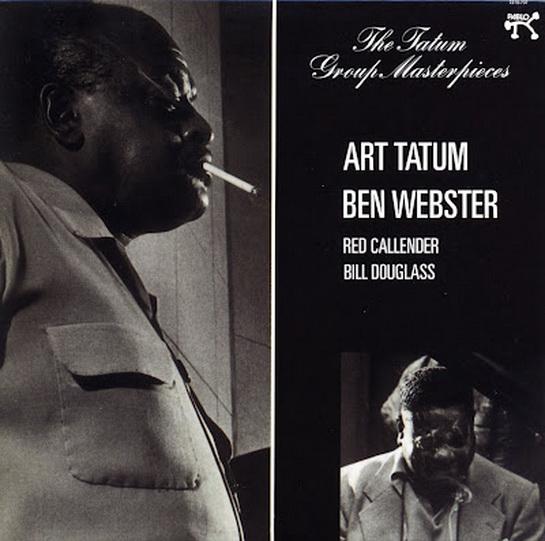
The only album-length collaboration between pianist Art Tatum and tenor saxophonist Ben Webster (accompanied by a rhythm section of Red Callender, bass, and Bill Douglass, drums) was this September 11, 1956, session under the auspices of Norman Granz’s Verve Records label. (It was also Tatum’s last recording session before his death.) Granz probably suggested the repertoire of standards by the likes of Kern and Hammerstein, Rodgers & Hart, and Cole Porter, but the melodies, of course, only provide a framework. On each track, Tatum leads things off, with Callender and Douglass coming in discreetly (and low in the mix). Then, at a certain point, Webster appears in the foreground, playing comparatively few notes and sticking much more to the melody than his partner. This is a good approach, since Tatum never subsides to simple comping; he just keeps soloing away under Webster’s rich tenor tones until Webster stops playing, and then keeps on to the end. So, although this is billed as a group effort, it’s not a group of equals or really one in which the players are cooperating with each other. Tatum might as well be playing solo, since he takes very little account of what’s happening around him. Granz makes it work by varying the volume of the different instruments in the mix, and the result is a fascinating study in contrasts.
album
Siempre habrá quien no tenga un amor o no pueda gozar entre amapolas, pero abra su cuerpo mudo —no muy lejos de la noche, a la urgencia delicada del rocío. Ella cantaba estas cosas en radical armonía con la dicha indecible de vivir ya muerta en vida y oculta del lenguaje, pequeña durmiente del valle. Pero alguien comió y bebió de su rocío haciendo escala por las venas para subir a las heridas frescas y penetrar su boca abierta. ¡Ahí está tu jardín, frágil centinela! Entre los berros azules del arroyo, tu nuca ya no teme al sueño junto al muro, no escucha los ecos de un mundo derogado. Fondo sin espejos. Canta muda tú, como si no pasara nada, que el amor esconde a sus muertos entre lo caído. ¡Espera, corazón mío! ¡Talita Cumi! Al final de todo jardín hay siempre otro jardín. Escucha al oscuro ruiseñor de una noche en medio del camino. ¿Quién no busca una muerte donde vivir? El pájaro pasa entre las lenguas donde arde el último poniente en tu lecho inflamado. Te traduciré del otro mundo, árida rosa tallada con mi boca. (Miguel Beirat)

